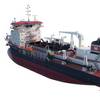Xeneta: No Silver Lining for Container Shipping in Brexit Storm
Xeneta, a global benchmarking and market intelligence platform for containerized ocean freight, believes that the UK’s decision to leave the European Union will impact negatively on all parties involved in the container shipping segment – from shippers, to freight forwarders and the container carriers themselves.
The firm, which crowd sources freight rates on over 60,000 port-to-port pairings worldwide, believes that the only thing that is certain right now is uncertainty.
“The last thing the container segment needs is further unpredictability and disruption,” comments Xeneta CEO Patrik Berglund. “Rates for shipping 40-foot containers have effectively collapsed over the past two years - with the short term average for Shanghai to Rotterdam now standing at 60% below its Summer 2014 level. This has been driven by chronic over-capacity and cut throat competition. Now we have Brexit to contend with.”
Berglund says that anything impeding free trade raises costs, but not to the benefit of any of the parties involved in the container supply chain: “For the last 40-plus years the UK has been part of a mega trading block capable of negotiating the most favourable trade treaties – and therefore import duties – with other blocks and nations. Now, all of a sudden, it’s going to have to sign new treaties with everyone, without the bargaining power of the EU in its corner, and that will undoubtedly lead to higher duties, and therefore costs for shippers.”
In terms of supply chain management, the decision looks certain to cause further headaches, as Berglund explains: “Optimal supply chain management relies on a quick and efficient international logistics network, and it goes without saying that guarded border crossings impede that process. The flow of containers will face a new bottleneck, increasing complexity and potentially forcing shippers to consider alternatives – such as more local sourcing (meaning less shipping), or re-positioning facilities in territories more conducive to easier trading.
“Supply chains in today’s globalised trading arena are complex and inter-connected, yet fine tuned to run efficiently, taking the path of least resistance wherever possible. Container shipping is an integral part of this, with all parties relying on smooth operation and predictable deliveries. The Brexit decision is like throwing a spanner in the works of this well-oiled machine.”
Berglund says it’s impossible to predict how the decision will impact on freight rates in the immediate future, citing the fact that the segment was unpredictable enough before this political bombshell exploded.
His current advice to all parties in the container chain is simple – “stay informed.”
He says: “A complex web of sometime subtle factors impact upon freight rates keeping them in a constant state of flux. Brexit is anything but subtle and the fallout will be widespread.
“All decision makers need to be aware of the latest developments in costs to empower making the best choices, and getting the right prices, for their cargoes. Big data resources like the Xeneta software platform - which boasts an unrivalled database of over 12 million contracted ocean freight rates, crowd sourced from more than 600 major international businesses – are the best way of getting a real-time image of what is happening right now, and reacting accordingly.
“When the only certainty is uncertainty,” he concludes, “you need to be sure you’re getting the information you need, when you need it.”










